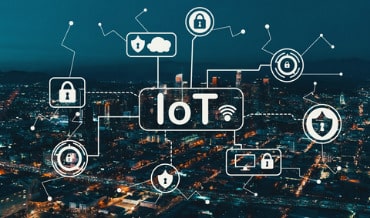Technocrats are building out the Internet of Things using 5G wireless communications to connect everything that can be connected. However, the IoT is infinitely hackable because of so many unsecured points of entry. This hackable playground is also extending to the Internet of Everything and the Internet of Bodies. Imagine someone gaining access to a patient’s pacemaker and turning it off. — Technocracy News & Trends Editor Patrick Wood
By: Elizabeth MacBride via CNBC
John Hultquist, vice president of intelligence analysis at Google-owned cybersecurity firm Mandiant, likens his job to studying criminal minds through a soda straw. He monitors cyberthreat groups in real time on the dark web, watching what amounts to a free market of criminal innovation ebb and flow.
Groups buy and sell services, and one hot idea — a business model for a crime — can take off quickly when people realize that it works to do damage or to get people to pay. Last year, it was ransomware, as criminal hacking groups figured out how to shut down servers through what’s called directed denial of service attacks. But 2022, say experts, may have marked an inflection point due to the rapid proliferation of IoT (Internet of Things) devices.
Attacks are evolving from those that shut down computers or stole data, to include those that could more directly wreak havoc on everyday life. IoT devices can be the entry points for attacks on parts of countries’ critical infrastructure, like electrical grids or pipelines, or they can be the specific targets of criminals, as in the case of cars or medical devices that contain software.
“What I wish is that the vulnerabilities of cybersecurity could never negatively affect human life and infrastructure,” says Meredith Schnur, cyber brokerage leader for US & Canada at Marsh & McLennan, which insures large companies against cyberattacks. “Everything else is just business.”
For the past decade, manufacturers, software companies and consumers have been rushing to the promise of Internet of Things devices. Now there are an estimated 17 billion in the world, from printers to garage door openers, each one packed with software (some of it open-source software) that can be easily hacked. In a conversation Dec. 26 with The Financial Times, Mario Greco, the group CEO of giant insurer Zurich Insurance Group, said cyberattacks could pose a larger threat to insurers than pandemics and climate change, if hackers aim to disrupt lives, rather than merely spying or stealing data.

IoT devices are a key entry point for many attacks, according to Microsoft’s Digital Defense Report 2022. “While the security of IT hardware and software has strengthened in recent years, the security of Internet of Things (IoT) … has not kept pace,” according to the report.
A rash of attacks that reached the physical world through the cyber world in the past year show the rising stakes. Last February, Toyota stopped operations at one of its plants because of a cyberattack. In April, Ukraine’s power grid was targeted. In May, the Port of London was hit with a cyberattack. That followed up on a 2021 that included to major attacks on critical infrastructure in the U.S., taking down energy and food supply operations of Colonial Pipeline and the JBS meatpacking conglomerate.
What many experts are anticipating is the day enterprising criminals or hackers affiliated with a nation-state figure out an easy-to-replicate scheme using IoT devices at scale. A group of criminals, perhaps connected to a foreign government, could figure out how to take control of many things at once – like cars, or medical devices. “We have already seen large-scale attacks using IoT, in the form of IoT botnets. In that case, actors leveraging unpatched vulnerabilities in IoT devices used control of those devices to carry out denial of service attacks against many targets. Those vulnerabilities are found regularly in ubiquitous products that are rarely updated.”
In other words, the possibility already exists. It’s only a question of when a criminal or a nation decides to act in a way that targets the physical world at a large scale. “It’s not always the art of the possible. It’s a market-driven thing,” Hultquist said. “Somebody figures out a scheme that is successful at making money.”
Article: Criminal Minds See The Internet of Things As The Next Big Hacking Prize
